Who's in charge - the Minister or the Ministry of Education?
While the Minister whitewashes the exterior of RSE, the Ministry keeps the interior the same.
In March 2025, Minister of Education, Erica Stanford removed the 2020 Relationships and Sexuality Education (RSE) Guide and recommended that, in the interim before the new curriculum is settled, schools should follow the 2007 Health curriculum.
What does the 2007 curriculum say about RSE?
There are four strands in Health education:
A - Personal growth and physical development,
B - Movement concept and motor skills,
C - Relationships with other people, and
D - Healthy communities and environments.
Translated into teaching topics, the concepts to be taught are straightforward and simple. For example, in strand A for seven year olds (Level 2), children discuss personal qualities and self-worth.
The discussion is student-led and about personal qualities, not the contested idea of identities as was pressed on the same age group in the removed RSE Guide, below.
The 2007 curriculum also pays heed to the beliefs and feelings of other people, as in strand A for Level 3 (9-11 year olds):
This is in stark contrast to Navigating the Journey which teaches as fact a set of beliefs held only by a minority. The resource for Level 3 coaches teachers to use language like this when showing diagrams of reproductive organs that do not have male or female labels (p62):
• About half the people in the world will have something that looks like this (show female reproductive system).
• About half will have something like this (show male system).
• Some people will have a different combination of ‘male’ and ‘female’ reproductive parts and genitalia. These people are called intersex.
• Do our body parts define who we are? (No. Some people with penises might feel more like girls and some people who identify as boys might have female body parts.) [Emphasis added.]
Teaching children about intersex conditions and transgender ideation is both scientifically inaccurate and not appropriate for their age. It introduces children to concepts that are beyond their cognitive and emotional ability to fully understand and thereby creates anxiety, disaffection, and the potential to generate very serious mental health disorders.
Sexual Wellbeing Aotearoa has assured schools that its NTJ resource meets the criteria of the 2007 curriculum, when it clearly does not. Nor is it compliant with the new draft RSE curriculum which does not contain any reference to gender identity and correctly identifies the binary reproductive system in humans.
Navigating the Journey is not compliant with the new direction of RSE and should no longer be in use in any schools.
Sidestep and carry on
When parents questioned why their school was still using NTJ, they were told that the Ministry of Education (MOE) had advised them they could continue using all their current resources despite the removal of the RSE Guide.
Either the memo about following the 2007 curriculum didn’t reach the public servants in the Ministry, or those people are serving their own agenda and not the government’s.
So we wrote to the Minister on 26 May: [Letters are slightly abbreviated]
Dear Minister Stanford,
In March, when you withdrew the RSE Guide from schools, you recommended that schools follow the 2007 Health education curriculum in the interim until the new RSE curriculum has been written.
Are you aware that a large number of schools have not changed their practice at all and are continuing to use the Navigating the Journey resource, produced by Sexual Wellbeing Aotearoa, which uses the language and beliefs of the rejected RSE Guide?
Even more alarmingly, are you aware that a number of schools have told parents that the Ministry of Education has approved the continued use of Navigating the Journey, which is clearly in contravention to your March recommendation? …
We ask that you instruct the Ministry of Education to inform schools that Navigating the Journey, along with any other resources that were sent to schools to be used with the RSE Guide, be immediately withdrawn.
We question the credibility of the public consultation on RSE we have just had when a partisan group like Sexual Wellbeing Aotearoa is allowed to continue its influence in schools, unabated.
As is often the case when writing to Ministers, our letter was diverted to the Ministry of Education, which replied on 26 June:
You are correct that the Relationships and Sexuality education (RSE) guidelines (2020) were removed earlier this year as part of our focus on developing a knowledge-rich curriculum grounded in the science of learning. It’s important to clarify that these optional guidelines were designed to work alongside mandated curriculum content set out in the 2007 New Zealand Curriculum (NZC), not replace it. The guidelines assisted teachers to implement the 2007 NZC and comply with community consultation requirements.
As part of the wider curriculum refresh, the Health & Physical Education learning area is currently being updated and is planned to be available to schools from 2026 and required for use from 2027. Until then, schools continue to use the 2007 NZC. Schools have the flexibility to select resources, activities, and learning contexts that best serve their students and local communities. As RSE is part of the Health & P.E. learning area, schools must include it in their teaching programmes using the 2007 NZC.
When the RSE guidelines were removed, we advised schools that existing plans did not need to be altered for the 2025 school year, and RSE teaching and learning programmes should continue to be informed by community consultation requirements. We did not advise schools on the use of any specific RSE resources.
In other words: deny the validity of the complaint, divert the responsibility to individual schools, and use buzz words - “knowledge-rich curriculum grounded in the science of learning” - to try to cover the fact that children around the country are still being taught dangerous nonsense about human sex.
So we wrote to the Minister again on 27 June:
It is highly disingenuous for the MOE to try to fobb us off by stating that the RSE Guide was written to complement the 2007 curriculum. As the MOE well knows the Guide was published in 2020, after the 2018 RSE 'refresh' in which 'gender identity' became a concept that was to be taught to five year olds and reinforced in every subsequent year. The 2007 curriculum talks about personal qualities, not identities and also teaches children to respect the beliefs and feelings of other people, in sharp contrast to the 2020 RSE Guide that ran roughshod over the rights of children, parents, and teachers, who know that humans cannot change their sex.
It is not good enough for the MOE to use the self-management of schools as an excuse for condoning the continued use of the NTJ resource. I am sure you are well aware that this resource coaches teachers to say "Some people with penises might feel more like girls and some people who identify as boys might have female body parts." The new draft RSE curriculum does not contain any reference to gender identity and correctly identifies the binary reproductive system in humans, therefore the NTJ resource is not compliant with the new direction of RSE and should no longer be in use in any schools…
We ask that you, as Minister for Education, reinforce to schools that your recommendation to follow the 2007 RSE curriculum means that resources based on the withdrawn RSE Guide are no longer fit for purpose.
There has been no reply as yet.
When the Minister refuses to meet with concerned groups like ours and diverts a complaint about MOE advice to the same Ministry for a reply, what options are left for parents? Only one - if your school continues to use the discredited NTJ resource or similar material, we suggest that you withdraw your children from the RSE section of the Health curriculum for at least the rest of 2025.
Embedded ideology
On the MOE website the pernicious influence of InsideOut remains fully embedded. The lobby group’s glossy booklets (funded by the MOE), are still highlighted and the website continues to tell schools that it is good practice to socially transition a child without informing the parents and that the demands of a single student outweigh the dignity and rights of all the others.
When will these ideological resources provided by a lobby group be withdrawn from the Ministry’s website?
Refer to our website for more details about Inside Out and its glossy marketing and the largely unqualified and inexperienced people who have such an outsized influence in our schools.
What parents can do
Remove your child wholly from RSE for the rest of 2025. Explain that it is not acceptable for the school to continue to teach concepts that were the subject of complaints about the RSE Guide and that do not appear in the draft framework or the 2007 curriculum.
Write to Erica Stanford, expressing your displeasure that gender ideology is still being taught in multiple schools, despite the removal of the RSE Guide. e.stanford@ministers.govt.nz
Speak up at the BOT elections to be held in September. Ask candidates these questions and vote accordingly:
Do you agree that humans cannot change sex?
Do you agree that children should not be encouraged to dissociate from their bodies by teaching them that they can choose their sex?
Do you agree that children should not be taught to use sex stereotypes as a marker for their sex?
Do you agree that single sex spaces should be reserved for each sex and that third spaces should be provided for those few students who are not comfortable with that arrangement?
Do you agree that books in the school library should provide age-appropriate, accurate information about binary reproductive sex and should not promote the ideological belief that a child’s sex is a choice?

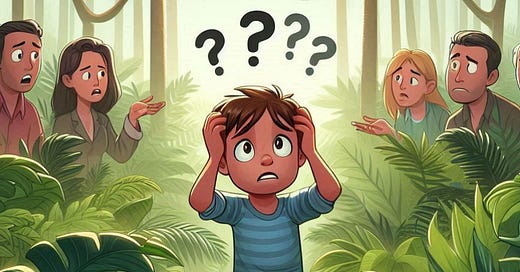




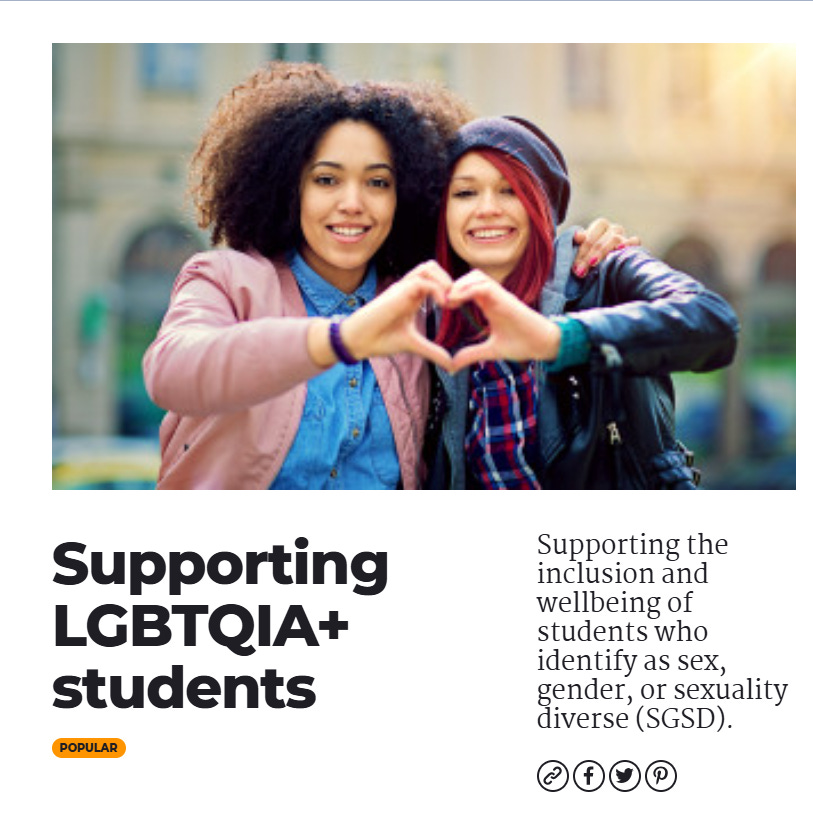
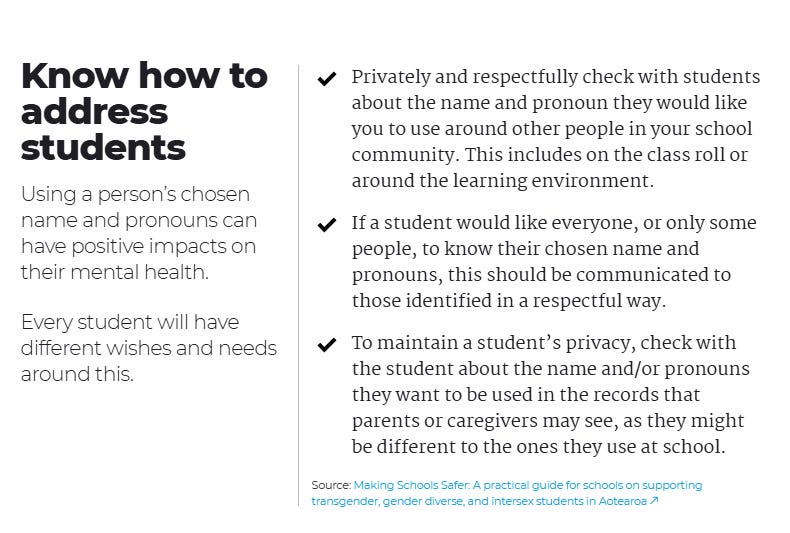
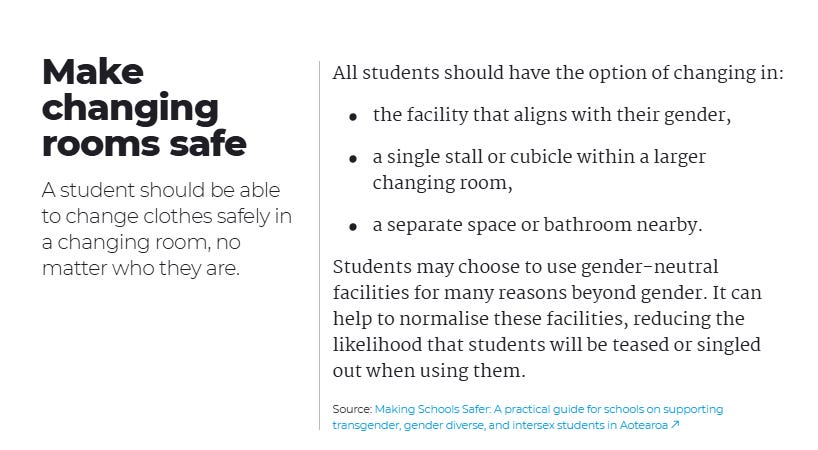
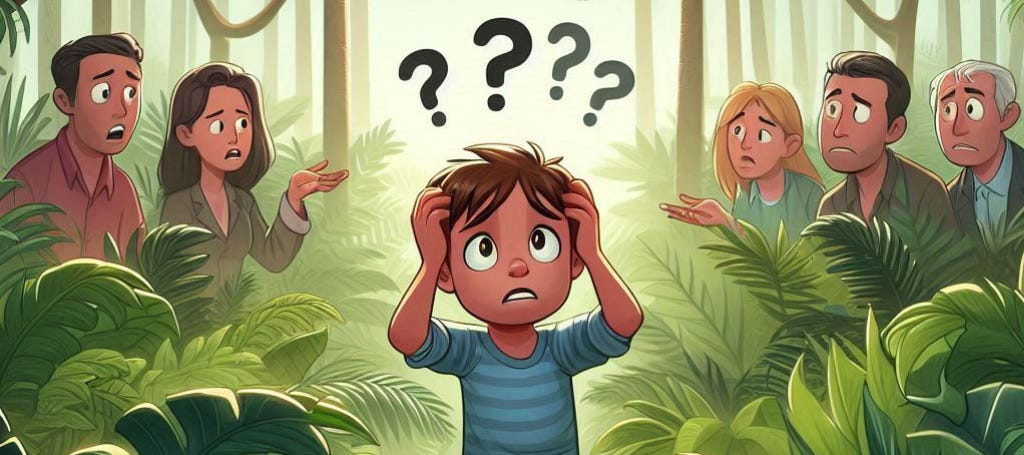
The gender-bender zealots are very, very determined to pursue their agenda. Thank goodness for groups like RGE who keep a wary eye on their activities keep us informed.
Readers interested in my paper in a peer-reviewed academic journal about so-called human rights education (a trojan horse for a sinister social engineering programme in which gender issues feature prominently) may like to enter the following in their search engine:
Vlaardingerbroek, B. (2015). "The shaky legal foundations of the global human rights education project", Journal of International Social Studies, Vol. 5 No. 1, 165-171.
Alternatively, shoot an email across to me and I will send you a soft copy as an attachment.
Regards one and all
Barend Vlaardingerbroek PhD
The Ministry of Education is very thoroughly captured by the genderborg and has been for ten plus years. Regrettably more women than men are Sexed Soul Scientologists, the civil service is female dominated, and the social engineering ministries are particularly female dominated.
The Head Offices are completely graduate-class, and there are more female graduates especially in law, communications, social policy, gender and other civil-service-bound degrees. Young, deeply conformist women are pouring out of the Unis and into MoE and the like, those that aren’t on board with the omnicause either keep quiet, or find their way into a less feminised less social-engineering organisation or career (or leave the country). Only true believers remain - and they are allowed to be vocal. Also, of course, there are “Rainbow Networks” everywhere in the civil service.
We saw today in the media what happened at IRD when someone made a quip about genderism, there have been other similar incidents publicised, and many more in which the civil servant didn’t go public.
The degree to which these (mostly) female civil servants - many of them young and keen to be seen to support the supposedly correct morality of the day - will go to to protect and promote genderism can’t be underestimated, it’s partly careerism, partly bekindism, and also very much in-group bonding and signalling they hold the “correct” high-status (graduate class etc) beliefs. The culture self-replicates and embeds as non conforming women, and men feel and are unwelcome. It is a big part of what makes Wellington so Very Wellington.
I don’t have any answers except these people are not being told “no” enough or encountering enough resistance from the wider public (who they look down on for wrongthink).